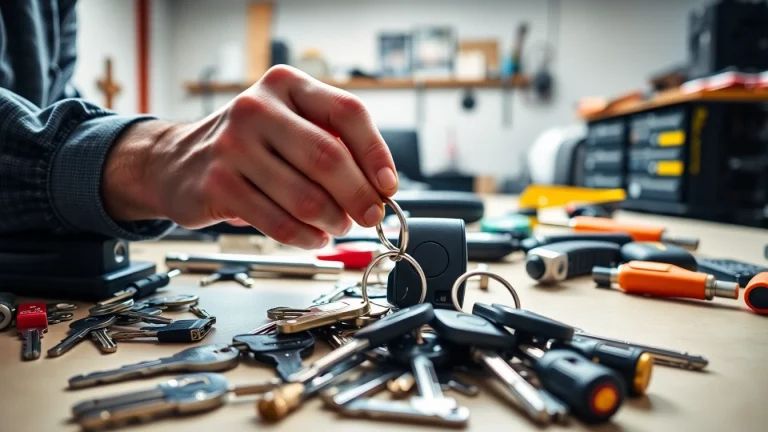
Find Used Vehicles: Your Comprehensive Guide to Buying Quality Pre-Owned Cars
Understanding the Used Vehicle Market
As the demand for sustainable and budget-friendly transportation options continues to rise, many consumers are turning their attention to used vehicles. The growing awareness about environmental issues, coupled with the financial advantages of buying pre-owned cars, has solidified the importance of understanding the used vehicle market. If you’re looking to find used vehicles that suit your needs and budget, it’s essential to grasp the trends, the benefits, and misconceptions surrounding this market before diving into your buying journey.
Current Trends in the Used Vehicle Market
The used vehicle market has witnessed dynamic changes in recent years, particularly influenced by economic shifts and technological advancements. One notable trend is the increase in the average age of vehicles on the road, which now stands at over 12 years. This rise reflects consumer preferences for longevity and quality in their vehicles.
Another significant trend is the emphasis on certified pre-owned (CPO) vehicles, which provide buyers with peace of mind through rigorous inspections and warranties. The availability of online platforms has made it easier for consumers to assess available options, compare prices, and make informed decisions, thus generating more interest in pre-owned vehicles.
Benefits of Buying Used Vehicles
Buying used vehicles comes with numerous advantages. Firstly, the depreciation rate of a new car is substantially higher in the first few years—around 20% to 30%. In contrast, a used vehicle has already absorbed much of that depreciation, making it a smarter financial choice for many buyers.
Secondly, used vehicles often come with lower insurance premiums compared to new cars, which can lead to further savings over time. Additionally, with a plethora of models available, buyers have the flexibility to select vehicles that may have been out of their budget when new.
Common Misconceptions About Used Cars
Despite the evident benefits, several misconceptions persist regarding used vehicles. One prevalent myth is that all used cars are unreliable. In reality, many pre-owned vehicles are in excellent condition, having been maintained properly by their previous owners. Furthermore, it’s a common belief that used cars lack modern features. However, many used vehicles boast advanced technology and safety features, especially those that are just a few years old.
Another misconception is that used cars are an inferior option compared to new ones. In fact, many models from reputable brands offer remarkable durability and performance, making them a solid investment for buyers.
How to Find Used Vehicles Effectively
Finding the right used vehicle might seem overwhelming at first, but with the right strategies, you can narrow down your choices and focus on options that best suit your needs.
Using Online Platforms and Resources
Online platforms have revolutionized the way consumers search for used vehicles. Websites like Autotrader, Cars.com, and Carfax provide comprehensive online databases of available vehicles, enabling consumers to filter results based on their specifications, including make, model, year, price, and location. Many of these platforms also offer user reviews and ratings, which can provide insight into specific vehicles’ performance and reliability.
Utilizing social media marketplaces, as well as specialized apps designed for vehicle sales, can help you discover local deals that might not be widely advertised. Be sure to check for any reported issues or recalls associated with your vehicle of interest using resources like the National Highway Traffic Safety Administration (NHTSA).
Local Dealership vs. Private Sellers
When seeking used vehicles, you have the option of purchasing from local dealerships or private sellers. Each option has its own pros and cons. Dealerships often provide more assurances regarding the vehicle’s condition, such as warranties and vehicle history reports. They might also offer financing options that can make your purchase manageable.
However, private sellers may offer lower prices given the absence of dealership overhead costs. Shopping through private channels typically requires more diligence on your part, as you should conduct rigorous inspections and potentially face less protection post-purchase. Weighing these factors carefully can help you determine the best approach for your situation.
Tips for Conducting a Successful Search
To streamline your search for used vehicles, it’s important to establish clear criteria. Start by listing out essential features or specifications that your dream vehicle must have. Make sure to consider factors such as fuel efficiency, safety ratings, and expected maintenance costs.
When searching, keep an open mind and explore multiple makes and models. You might discover alternatives that not only meet your requirements but also exceed your expectations. It’s also wise to set a budget before you begin, as this will narrow down your options and help prevent overspending.
Evaluating Used Vehicles Before Purchase
Once you narrow down your choices, the next step is to properly evaluate the vehicles before making a commitment.
Key Features to Look For in Used Cars
When assessing used vehicles, pay close attention to several key features. Reliability is paramount; consider consulting reliability ratings from consumer reports to steer you towards trustworthy models. Safety features, such as airbags, anti-lock brakes, and crash-test ratings, should also be considered as non-negotiables.
Additionally, modern conveniences like Bluetooth connectivity, backup cameras, and navigation systems can enhance your driving experience. Furthermore, fuel efficiency plays an essential role in minimizing long-term costs, especially if you plan on using the vehicle for daily commuting.
Checklist for Vehicle Inspection
A thorough inspection of the vehicle is vital before finalizing your purchase. Use the following checklist as a guide:
- Exterior Inspection: Look for any signs of rust, uneven paint, or dents.
- Interior Condition: Check the upholstery, dashboard electronics, and overall cleanliness.
- Under the Hood: Assess oil levels, battery condition, and inspect for leaks.
- Test Drive: Ensure a thorough inspection through a test drive, paying attention to brakes, alignment, and noise levels.
Consider bringing along a trusted mechanic to assist with the inspection. Professional insight can unveil hidden issues that might not be apparent to an untrained eye.
Understanding Vehicle History Reports
Always obtain a vehicle history report (VHR) before purchasing a used car. Resources like Carfax and AutoCheck provide essential insights into the vehicle’s past, including any accidents, title issues, or odometer discrepancies.
Pay careful attention to factors such as the number of previous owners, service history, and the vehicle’s accident history. This information can help confirm whether the vehicle has been properly maintained and can further reassure you of its overall condition.
Negotiating and Finalizing Your Purchase
Once you’ve completed your due diligence, you can begin the negotiation process.
Effective Negotiation Strategies for Buyers
Negotiation is a vital skill when purchasing a used vehicle. Start by gathering data about the vehicle’s market price using resources like Kelley Blue Book, which provides fair market values based on the car’s condition, mileage, and features. This information will empower you during negotiations, allowing you to present a strong case for a lower price if necessary.
Be prepared to walk away if the price feels unreasonable. This shows the seller you are serious and knowledgeable, which can lead to better offers as they may recognize your commitment to finding a fair deal.
Understanding Pricing and Financing Options
When it comes to financing, explore all available options, including loans from banks, credit unions, or dealership financing. Be mindful of the total costs involved—including interest rates, readily available terms, and possible fees—before committing to any financing plan.
It’s also wise to calculate the total cost of ownership, encompassing insurance, maintenance, and fuel expenses. A slightly higher purchase price may actually lead to lower costs in the long term if the vehicle is reliable and economical.
What to Expect from the Buying Process
The buying process typically begins with vehicle selection and inspection, followed by negotiation and paperwork completion. Be prepared to provide essential documentation, such as a valid driver’s license and proof of insurance. It’s also worthwhile to familiarize yourself with state-specific regulations regarding vehicle registration and sales tax, which can have an impact on the final cost of your used vehicle.
Once the paperwork is finalized, you will usually need to arrange for the transfer of ownership, which may involve visiting a Department of Motor Vehicles (DMV) or similar agency in your area.
Post-Purchase Considerations
After securing your new (to you) vehicle, it’s essential to consider some post-purchase steps to ensure a successful ownership experience.
Setting Up Your Used Vehicle for Success
Before hitting the road, consider giving your used vehicle a thorough cleaning and inspection. Replacing essential fluids, such as oil and antifreeze, is a smart move, as is investing in a comprehensive maintenance check-up with a certified mechanic.
Additionally, assessing the vehicle’s tires for wear and ensuring they are properly inflated can enhance your vehicle’s safety and performance. This precautionary maintenance helps ensure your vehicle remains in optimal condition and increases longevity.
Insurance and Maintenance Tips
Securing the right insurance coverage is crucial following your purchase. Consult multiple insurance providers to find the best rates and coverage for your specific vehicle. Ensure you understand the terms of the policy and any coverage limits you may encounter.
Routine maintenance should also be prioritized. Following the manufacturer’s recommended service schedule can prevent more extensive repairs down the line. Essential maintenance checks include oil changes, brake inspections, and battery assessments to uphold your vehicle’s performance and safety.
Resale Value and Future Considerations
Thinking ahead is critical when buying a used vehicle. Understanding that depreciation affects all vehicles means you should be aware of potential resale value when making your choice. Certain brands and models retain their value better than others; conducting research on resale trends can benefit your long-term plans.
Ultimately, always keep the possibility of resale in mind. Maintaining your vehicle in excellent condition, documenting all service records, and staying informed on market trends can significantly affect how well you are able to sell your vehicle in the future.


